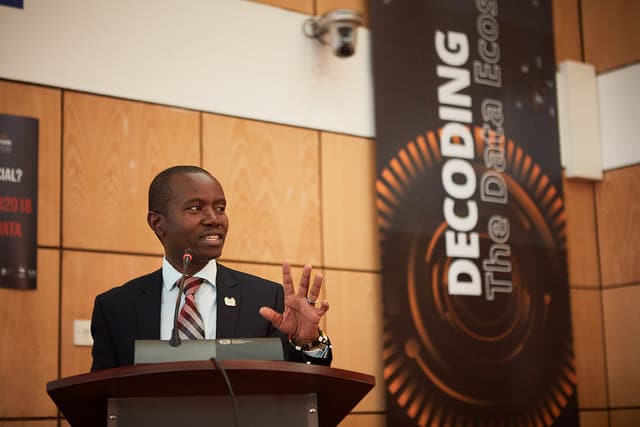Kenya’s ICT Cabinet Secretary: Data is ‘key’ to smart farming
Smart farming is key to developing sustainable agriculture and this can be enabled by use of data in the sector, Kenya’s Cabinet Secretary Joe Mucheru says.

Hon. Joseph Mucheru addresses the audience at the opening of the 2nd Big Data in Agriculture Convention in Nairobi, Kenya on 3-5 October 2018.
Addressing hundreds of participants at the 2018 Global CGIAR Platform for Big Data in Agriculture Convention in Nairobi, Cabinet Secretary in the Ministry of Information and Communications said that in order to mitigate climate change, which is a key barrier to resilient food production, data must be harnessed and applied to ensure that food crops are available and affordable.
He noted that experts have estimated by the year 2020 nine out of the ten major world crops will experience a reduction or stagnant growth rates while average prices will increase dramatically as a result of climate change.
Enumerating lessons that Kenya has learned in building the data ecosystem for resilient food systems, Mucheru said that there are four “enablers” that must act together to ensure successful data harnessing. They include political support, open data legislation, data infrastructure and demand for data by all stakeholders including farmers, academics, government, NGOs.
“Resilient food systems are critical to the success of the big four agendas” said Mucheru in reference to the current government’s blueprint for accelerated progress in four key areas of development namely; agriculture, healthcare, housing and manufacturing.
Agriculture, he said, cuts across the other three agendas and its importance is also seen in the role the sector plays in the country’s GDP, which currently stands at 27%.
“The sector also contributes to 65% of the country’s export earnings and employs more than 75% of the population,” said Mr. Mucheru.
He underscored the centrality and importance of data in achieving not only food security but also the big four agendas for the country adding that it should not be data for data sake.
“Data must be made available to all stakeholders including farmers, policy makers, markets, law makers and implementers. All stakeholders need to be coordinated in the architecture of the big data ecosystem,” said Mucheru.
Some of the barriers to big data ecosystems, he said, include; inventory of data, lack of data standards for agriculture, data integrity, incentives for data contribution, the utility of the data and derivative works.
The Cabinet Secretary noted that despite the myriad of challenges in building the data ecosystem, all hope is not lost. He described Kenya’s measurable progress and how the country is already on the road to smart farming through various programs spearheaded by the government and its development partners. He enumerated some of the anticipated progress in areas of precision agriculture, GPS for climate and soil data, data collection and artificial intelligence, and a national livestock identification system,
Mucheru announced that the government will be setting up 1000 small and medium enterprises for agro-processing and in effect create 200,000 new jobs in the sector and about 800,000 jobs in the sub-sector.
Roseleen Nzioka
Nairobi, Kenya
This is one of a series of blogs written by one of our Youth in Data media delegates who participated in the 2nd Big Data in Agriculture Convention in Nairobi, Kenya on 3-5 October 2018.




